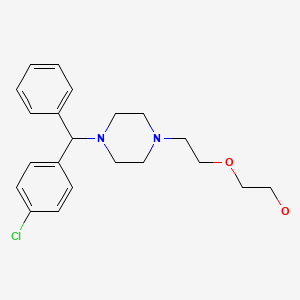Attribution Statement: LactMed is a registered trademark of the U.S. Department of Health and Human Services.
NCBI Bookshelf. A service of the National Library of Medicine, National Institutes of Health.
Drugs and Lactation Database (LactMed®) [Internet]. Bethesda (MD): National Institute of Child Health and Human Development; 2006-.
CASRN: 68-88-2

Drug Levels and Effects
Summary of Use during Lactation
Small occasional doses of hydroxyzine would not be expected to cause any adverse effects in breastfed infants. Larger doses or more prolonged use may cause drowsiness and other effects in the infant or decrease the milk supply, particularly in combination with a sympathomimetic such as pseudoephedrine or before lactation is well established. Other agents are preferred, especially while nursing a newborn or preterm infant.
Drug Levels
Maternal Levels. Relevant published information was not found as of the revision date.
Infant Levels. Relevant published information was not found as of the revision date.
Effects in Breastfed Infants
In one telephone follow-up study, mothers reported irritability and colicky symptoms 10% of infants exposed to various antihistamines and drowsiness was reported in 1.6% of infants. None of the reactions required medical attention.[1]
All adverse reactions in breastfed infants reported in France between January 1985 and June 2011 were compiled by a French pharmacovigilance center. Of 174 reports, hydroxyzine was reported to cause adverse reactions in 8 infants and to be one of the drugs most often suspected in serious adverse reactions, primarily sedation.[2]
Effects on Lactation and Breastmilk
Antihistamines in relatively high doses given by injection can decrease basal serum prolactin in nonlactating women and in early postpartum women[3,4] However, suckling-induced prolactin secretion is not affected by antihistamine pretreatment of postpartum mothers.[4] Whether lower oral doses of antihistamines have the same effect on serum prolactin or whether the effects on prolactin have any consequences on breastfeeding success have not been studied. The prolactin level in a mother with established lactation may not affect her ability to breastfeed.
The breastfeeding mother of a 5-week-old infant was diagnosed with bipolar disorder, panic attacks and anxiety disorder. She was started on hydroxyzine 50 mg at an unspecified interval and took it for 3 to 5 days with no effect on milk production. She was then started on aripiprazole 5 mg at an unspecified interval. After 5 days, she reported a decrease in milk production that required supplementation with formula. Nine days after stopping both drugs, her milk supply returned to normal. The decreased milk supply was possibly caused by the medications, with aripiprazole most likely.[5]
Alternate Drugs to Consider
References
- 1.
- Ito S, Blajchman A, Stephenson M, et al. Prospective follow-up of adverse reactions in breast-fed infants exposed to maternal medication. Am J Obstet Gynecol. 1993;168:1393–9. [PubMed: 8498418]
- 2.
- Soussan C, Gouraud A, Portolan G, et al. Drug-induced adverse reactions via breastfeeding: A descriptive study in the French Pharmacovigilance Database. Eur J Clin Pharmacol. 2014;70:1361–6. [PubMed: 25183382]
- 3.
- Pontiroli AE, De Castro e Silva E, Mazzoleni F, et al. The effect of histamine and H1 and H2 receptors on prolactin and luteinizing hormone release in humans: Sex differences and the role of stress. J Clin Endocrinol Metab. 1981;52:924–8. [PubMed: 7228996]
- 4.
- Messinis IE, Souvatzoglou A, Fais N, et al. Histamine H1 receptor participation in the control of prolactin secretion in postpartum. J Endocrinol Invest. 1985;8:143–6. [PubMed: 3928731]
- 5.
- Yskes R, Thomas R, Nagalla ML. A case of decreased milk production associated with aripiprazole. Prim Care Companion CNS Disord 2018;20:18l02303. PMID: 30549496. [PubMed: 30549496]
Substance Identification
Substance Name
Hydroxyzine
CAS Registry Number
68-88-2
Disclaimer: Information presented in this database is not meant as a substitute for professional judgment. You should consult your healthcare provider for breastfeeding advice related to your particular situation. The U.S. government does not warrant or assume any liability or responsibility for the accuracy or completeness of the information on this Site.
- User and Medical Advice Disclaimer
- Drugs and Lactation Database (LactMed) - Record Format
- LactMed - Database Creation and Peer Review Process
- Fact Sheet. Drugs and Lactation Database (LactMed)
- Drugs and Lactation Database (LactMed) - Glossary
- LactMed Selected References
- Drugs and Lactation Database (LactMed) - About Dietary Supplements
- Breastfeeding Links
- PubChem SubstanceRelated PubChem Substances
- PubMedLinks to PubMed
- Review Meclizine.[Drugs and Lactation Database (...]Review Meclizine.. Drugs and Lactation Database (LactMed®). 2006
- Review Doxylamine.[Drugs and Lactation Database (...]Review Doxylamine.. Drugs and Lactation Database (LactMed®). 2006
- Review Tripelennamine.[Drugs and Lactation Database (...]Review Tripelennamine.. Drugs and Lactation Database (LactMed®). 2006
- Review Cyclizine.[Drugs and Lactation Database (...]Review Cyclizine.. Drugs and Lactation Database (LactMed®). 2006
- Review Levocetirizine.[Drugs and Lactation Database (...]Review Levocetirizine.. Drugs and Lactation Database (LactMed®). 2006
- Hydroxyzine - Drugs and Lactation Database (LactMed®)Hydroxyzine - Drugs and Lactation Database (LactMed®)
Your browsing activity is empty.
Activity recording is turned off.
See more...
